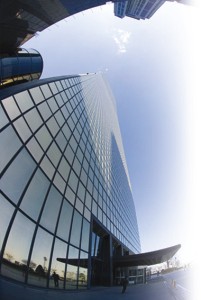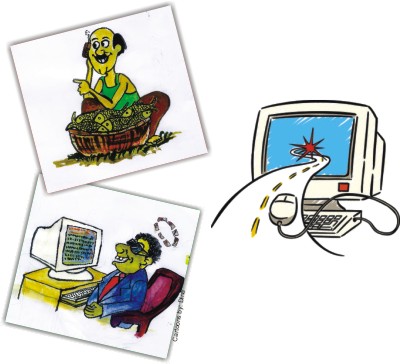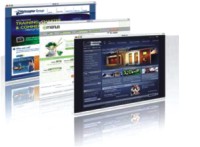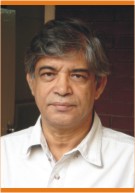| Spotlight
Dream of a Digital Bangladesh
Prof. Md. Anwarul Kabir

The electoral pledge of the newly installed government has popularised the buzzword Digital Bangladesh in all segments of society. Everybody now is eager to explore the term Digital Bangladesh and its possible impact on society.
Broadly speaking, a digital society ensures an ICT driven knowledge-based society where information will be readily available online and where all possible tasks of the government, semi-government and also private spheres will be processed using state of the art technology. In other words, we have to establish technology-driven e-governance which includes e-administration, e-commerce, e-production, e-agriculture, e-health etc.
 e-Governance enables the continuous enhancement of the actions of the State, focuses on the efficiency of the internal administration and establishes an Information Management System to arrange internal processes speeding up decision-making at all levels of the government. e-Governance aims to place the government within the reach of all citizens increasing transparency and citizen's participation. Thus, the development of e-Governance should promote universal access to government's services, integrate administrative systems, networks, and databases, and make such information available to the citizens via Internet. In a nutshell, such e-Governance should transform the government into a citizen- centric technological driven one. e-Governance enables the continuous enhancement of the actions of the State, focuses on the efficiency of the internal administration and establishes an Information Management System to arrange internal processes speeding up decision-making at all levels of the government. e-Governance aims to place the government within the reach of all citizens increasing transparency and citizen's participation. Thus, the development of e-Governance should promote universal access to government's services, integrate administrative systems, networks, and databases, and make such information available to the citizens via Internet. In a nutshell, such e-Governance should transform the government into a citizen- centric technological driven one.
To make a Digital Bangladesh as envisioned by the government, at first we need to chalk out a roadmap assessing the relevant issues, for instances, ICT infrastructure, Internet accessibility, trend of e-Commerce, availability of ICT professionals, competence of different sectors of the government in the contemporary Bangladesh. Based on such an assessment or baseline survey we need to adopt a holistic approach in designing a roadmap for digital Bangladesh.
Albeit, in Bangladesh a few private establishments (e.g. different mobile operators, private banking sector) have initiated the process of digitization in rendering their service or products, progress of the government in this context is quite insignificant.
For example, different ministries though have implemented their websites, they only disseminate information on their respective sites. These web sites do not support any sort of transaction of public interests - the major ingredient of e-Governance. As for examples, inclusion of different transactional processes like e-procurement, e-tender in these sites is necessary to make them e-Governance in true sense. In e-Governance environment all governmental organizations should be networked and interconnected. This connectivity facilitates exchanging information among different organs of the government without any manual intervention. Ideally, for this, we need to build up IOS (Inter Organisational Systems) or EDI (Electronic Data Interchange) software. Unfortunately, till date all software systems that developed in our governments' various organisations are discrete in nature and so they do not support inter-departmental or inter-organisational data sharing technique.
One success story of the government frequently cited in the media is the creation of voters/citizens database within the shortest span of time. Yet, this is a myth indeed. Instead of following network based regional distributed database system, creation of such database has lost its applicability in reality. For this reason, in the last general election voters ID cards could not be used.

In private sphere, the banking sector though has incorporated e-banking, it faces barriers in smooth business transactions as Bangladesh Bank is still reluctant to use full internet based banking activities. Even our export-import business concerns are also in crisis in online transactions with their global business partners. Perhaps the mobile operators have done a tremendous job to lead the country towards digital society.
 Due to their success, the majority of the people of the country are now connected in the communication network. This mobile communication infrastructure should be treated as an asset for the proposed Digital Bangladesh or e-Governance. As the major stakeholders of the Digital Bangladesh are the citizens of the country, they must be ICT enabled. So, making them ICT enabled is a precondition of Digital Bangladesh. For this, a special attention should be paid to the education sector of the country. We must ensure quality education from primary to tertiary level. Right now, our public educational institutes, especially from primary to secondary levels, are facing severe crisis in rendering quality education for various reasons. The government must resolve this crisis with a view to promoting quality education. Besides, to make the ICT enabled society, we must introduce basic ICT education at primary level. For this every school and college should be equipped with computer labs with the Internet facility along with appropriate curriculum and quality computer teachers. Due to their success, the majority of the people of the country are now connected in the communication network. This mobile communication infrastructure should be treated as an asset for the proposed Digital Bangladesh or e-Governance. As the major stakeholders of the Digital Bangladesh are the citizens of the country, they must be ICT enabled. So, making them ICT enabled is a precondition of Digital Bangladesh. For this, a special attention should be paid to the education sector of the country. We must ensure quality education from primary to tertiary level. Right now, our public educational institutes, especially from primary to secondary levels, are facing severe crisis in rendering quality education for various reasons. The government must resolve this crisis with a view to promoting quality education. Besides, to make the ICT enabled society, we must introduce basic ICT education at primary level. For this every school and college should be equipped with computer labs with the Internet facility along with appropriate curriculum and quality computer teachers.
At tertiary level too, the quality of education is not up to the mark. To make a Digital Bangladesh, a good number of research oriented innovative young workforce is required. So, the government must ensure the quality education at university level too. Moreover, at higher education, use of modern ICT based state of the art technology, for instances, digital library, video lecture, multimedia class room environment will further promote the quality aspect of education. Building up of a separate digital network for educational institutes should also be considered for resource sharing among the university. Besides, e-learning based distance learning education should also encourage as it can address the wide range of the citizen.
Creation of distributed database is one of the essential features of the e-Governance. Decentralized or localized database ensures autonomy as well as reduces traffic loads in network communication. Keeping this in mind, we need to design e-Governance for Bangladesh. Strategically, we have to prioritize the sectors of the government which is to be addressed first. For any Good-governance, Local Government is the vital and crucial and in Bangladesh this is our Upazilla administrative unit. So, e-Governance in Bangladesh should be initiated at Upazilla level first. Perhaps, this bottom up approach (i.e. starting from Upazilla) strategy for e-governance is the most appropriate in country like ours, where the majority of the population lives in villages under Upazilla administrations.
 Digital Bangladesh must reflect the essential features of Good-governance. Technology alone can not ensure that. Rather, the government must work at the policy level. Unfortunately, many of our governmental policies still follow the anti-people colonial legacy, which in turn tarnish the transparency of decision making processes of the government. Discarding many of such anti-people policies, the government must introduce citizen-centric policies at the state level. Besides, in technological front, we need to formulate a realistic ICT-policy along with the cyber law in order to facilitate the Digital Bangladesh. Digital Bangladesh must reflect the essential features of Good-governance. Technology alone can not ensure that. Rather, the government must work at the policy level. Unfortunately, many of our governmental policies still follow the anti-people colonial legacy, which in turn tarnish the transparency of decision making processes of the government. Discarding many of such anti-people policies, the government must introduce citizen-centric policies at the state level. Besides, in technological front, we need to formulate a realistic ICT-policy along with the cyber law in order to facilitate the Digital Bangladesh.
In designing the roadmap, we must ensure that Digital Bangladesh does not promote the digital gap in society. As the major objective of Digital Bangladesh is to ensure the Good-governance in society, all citizens of the country should have equal opportunity to be worthy citizens in Digital Bangladesh. Finally, it can be stated that we have resources in terms of manpower. Among the new generation, many are getting technologically solvent. We can use them in creating the proposed Digital Bangladesh. But preconditions for such a huge task, the government needs to be honest, transparent, and stable with a clear vision for future.
Md. Anwarul Kabir is a senior Faculty Member of Computer Science Department, AIUB and is a freelance writer. email: kabir@aiub.edu
 Interview of Mustafa Jabbar, Interview of Mustafa Jabbar,
President, Bangladesh Computer Samity and CEO, Ananda Computers
Interview taken by Mahdin Mahboob
Star Campus (SC): The present government has promised a 'Digital Bangladesh' by the year 2021. What exactly does this cover and how achievable do you think are these targets?
Mustafa Jabbar (MJ): The government has declared that they will establish Digital Bangladesh by 2021. I do not know what the government has thought or what exactly is its plan. I hope we will be getting a specific policy, action plan and roadmap from the govt. soon. But to me Digital Bangladesh is a dream of a nation which has all the ingredients of happiness and prosperity. It is neither only computer learning nor using computers, those are not the issues.
My Digital Bangladesh program is as follows:
Digital Bangladesh Program: We are drawing attention of our nation to a Digital Bangladesh program to be implemented by 2021, the year of golden jubilee of our independence. Here is the program for building a Digital Bangladesh. This program is not an ICT only activities but a national agenda.
Main program: The country will become a Digital
Bangladesh and all its activities will be run in a way that the people of the country will be able to take direct or indirect part in governing the country. All information other than those which are related to the security and sovereignty of the country will be available to the people. The govt. will thus be transformed to a digital govt. and it will provide all citizen services through digital means. All its information will be stored in digital form and the decision making process of the govt. will be digital. A nationwide digital nervous system will be developed to run the digital govt. People working in the govt. must be capable of using ICT as their working tool. New recruitments will ensure the newcomers to have adequate knowledge in ICT.
A digital education system with compulsory computer education having computer as an educational tool will be introduced phase by phase immediately. Usage of Computer in education will start from early childhood. Every house will have 1mbps broadband internet and every student will have a computer by 2021.
 All laws will be updated and new laws will be formulated keeping in view of the knowledge-based society. Amendments will be made in the CRPC in accordance with the need of the new patterns of crime involving technologies, cyber crime, cyber communications, new media and IPR (Intellectual Property Rights). New process and technologies will be adopted to fight new type of crimes. All laws, DLR, case histories, FIR, hearings, verdicts and details of cases will be available online. Citizens will be able to submit FIR and crime information online. All laws will be updated and new laws will be formulated keeping in view of the knowledge-based society. Amendments will be made in the CRPC in accordance with the need of the new patterns of crime involving technologies, cyber crime, cyber communications, new media and IPR (Intellectual Property Rights). New process and technologies will be adopted to fight new type of crimes. All laws, DLR, case histories, FIR, hearings, verdicts and details of cases will be available online. Citizens will be able to submit FIR and crime information online.
Videoconferences will be introduced in the courts.
Business, commerce and industries will be managed and run with ICT tools.
State will ensure the growth, protection and development of Bengali culture, Bangla literature and language in the digital age. It will also ensure the growth, protection and development of other language, culture and languages in the same way as the state languages.
New economy, knowledge economy or digital economy will be introduced. Share of GDP will be increased from the IP based products.
However reading the documents and getting ideas on this issues from WSIS (World Summit on the Information Society) summits, it seems that the general perception to Information Society or knowledge based society is to disseminate information through Internet. But to me it is not only information that are to be available to the people of the world but to change the world and definitely to have the third wave or the information revolution. It is therefore important that some commitments are to be there in view of our socio-economic-political and cultural aspects.
Other related programs towards Digital Bangladesh:
1) State will have to take responsibility of fulfilling the minimum and basic need of all the citizens of the country. People will pay taxes to the state and the Govt. will not provide food, cloth, education, home and healthcare. Govt.'s attitude towards counting of profit and loss and commercialization of basic human needs should be stopped. At the same time all citizens should be given equal opportunity and ensure minimum employment according to his/her ability. Birth of looter burgeons have to be stopped too. Steps are to be taken to remove poverty and eliminate digital divide. State will have to provide allowances to disabled, jobless, otherwise unable, poor freedom fighters, poor senior citizens, war and crime victims, poor widows and socially disadvantaged people for their minimum survival.
2) The state will be fully democratic, nationalist, secular and socialist. Its economic policy will be in favour of the farmers, workers, middle class, professionals and common people. It will not necessarily encourage burgeons.
3) A strong and working local govt. system will be introduced to ensure the ownership of the state to the people of Bangladesh. All stages of the govt. e.g. Village, Union, Upazilla, District and the Central govt. will be run by the directly elected representatives of the people. There will be an elected parliament at the center which will enact law and formulate policies. There will be local govt. at the District-City, Upazilla-Town and Union and Village level. There will be an advisory council with equal number of MPs to assist the national govt. which will be nominated by the political parties as per the ratio of their seat in the parliament. Each independent MP will be able to nominate one advisor. Local administration and law enforcing authorities will be controlled by the elected representatives.
4) Land system of the country will be reformed. Misuse
of the land will be stopped and proper, planned use of all lands will be ensured. All information including ownership, registration, transfer, map etc will be available online and in digital format. Govt. will provide all support and necessary subsidy to the farmers. HYV and Hybrid corps will be invented and introduced and fertilizer, seeds and irrigation will be ensured in a subsidized/fare price. Food production will get priority with diversification of economical profitable and export oriented products. All steps will be taken to preserve the agricultural products. Co-operative systems will be introduced to ensure optimum use of land. Research on agricultural areas will get priority. Immediate attempts will be taken to convert the inventions into products. Leasing systems of the water bodies will be stopped and social ownership will be ensured.
5) There will be only one system of education in the country. Priority will be given to the science and technology education. Computer Science will be a compulsory subject up to 12th class. All educational institutes will have Internet connection and computer labs. All students will have PCs of their own. The education system will be digital. Computer will be used as an educational tool. All books and educational resources will be transformed into software and will be available in digital format.
6) All forces including army, air force, navy, RAB, police, BDR and community forces will be equipped with the state of the art security products having ICT in it. State will ensure security to all citizens. It will also ensure privacy of every citizen.
7) Industries of the country will be divided in three basic categories; namely agro based lifestyle based and knowledge based. Agro based industries will be primarily food based. Lifestyle based industries will be daily essentials related to livelihood and the rest will be knowledge based. Knowledge based industries will be primarily IP based. Industries will not only be urban based. Agro based industries will be village based. Knowledge based and Lifestyle based industries will be located in villages and cities. There will be an industrial park for every 10 thousand citizens. Special support will be given to technology parks.
8) The economic system will not be capitalistic-it will be a mixture of free and controlled economy. State ownership and private ownership will stay side by side. Large corporations will have to ensure ownership of the common people like farmers, workers and professionals. States will encourage small and medium enterprises to grow. State will invest in those areas that will not look profitable to the private sectors. State will provide subsidy to export, public services, essential commodities and agro-based sectors. Economic growth has to be ensured at two digit figures. Per capita income in 2021 should be not less than 1500 dollars. All steps will be taken to protect intellectual properties. Export of ICT products and services, agricultural and industrial products, garments and services will be encouraged.
9) Foreign policy of Bangladesh will be in favour of the poor people of the world. It will organise a regional union in South Asia.
10) Public transport system will be modern, cheap, fast and comfortable.
11) All anti people, undemocratic and communal clauses will be removed from the constitution. Freedom of judiciary, election commission and media in real sense will be ensured. Political parties and their working methodologies will be democratic and transparent.
It is obvious that the govt. will have to ensure most of the implementations of the above points. Let us hope that the future governments of Bangladesh will also do the needful to build a Digital Bangladesh.
I definitely believe that the program can be implemented.
SC: How will bus nesses/industries/agriculture and the banking sector benefit from this?
MJ: If you look at the program you will find the benefits being defined within the framework of the program.
SC: What major obstacles (electrical power shortage, internet penetration outside Dhaka, English education) should the government address first in order to successfully make a Digital Bangladesh?
MJ: To me only the mindset is the problem. Other problems can be solved.
Digital Bangladesh: What Might Lie Ahead
Ridwan Karim
 We have all been hearing the phrase 'Digital Bangladesh' uttered incessantly by the media pundits in recent times. But what will life really look like through a digital prism? Will the time-consuming problems encumbering our day-to-day lives disappear? Or will they simply be replaced by virtual ones? The following hodge-podge mixture of how digitization has affected our Asian neighbours will give the readers some idea about what lies ahead for Bangladesh (assuming, of course, that the political parties will deliver on their promises). We have all been hearing the phrase 'Digital Bangladesh' uttered incessantly by the media pundits in recent times. But what will life really look like through a digital prism? Will the time-consuming problems encumbering our day-to-day lives disappear? Or will they simply be replaced by virtual ones? The following hodge-podge mixture of how digitization has affected our Asian neighbours will give the readers some idea about what lies ahead for Bangladesh (assuming, of course, that the political parties will deliver on their promises).
The concept of electronic money is not a new one. But Hong Kong's Octopus card system has surpassed all expectations regarding the use of digital cash. The Octopus card is a rechargeable, contact-less, stored value smart card used to transfer electronic payments in online or offline systems in Hong Kong. Launched in September 1997 to collect fares for the city's mass transit system, the Octopus card system has since grown into a widely used payment system for virtually all public transport in Hong Kong. It is also used for payment at convenience stores, supermarkets, fast-food restaurants, on-street parking meters, car parks, and other point-of-sale applications such as service stations and vending machines. People in Hong Kong simply do not carry loose cash with them any more. Imagine how much simpler life would be without having to peruse through your wallet for the elusive change. The profusion of ATM machines in the streets of Dhaka is at least an indication that Bangladeshis are getting more and more accustomed to using electronic money.
You cannot talk about digital Asia without mentioning Japan. Stories regarding their technological know-how have grown into legendary proportions, giving rise to many myths.
Like the one about how each Japanese household owns a super-hi-tech toilet with a control panel that makes it look like the cockpit of a plane. Oops, sorry…this one's true! The toilets basically look like a standard model, except for the control pad and the hand-held remote control! Forget that you need to know three alphabets to read a Japanese newspaper. Forget horse sushi. The most puzzling thing for many foreigners in Japan is the toilet.
In the rest of the world, a cell-phone is a tool for communication. In Japan, it's a lifestyle. Most of the mobile phones in Japan have e-wallet, applications, music, and built-in Internet. Japanese people are known to be extremely tech-savvy, and people routinely use cell phones to buy things, search for restaurants, watch movie downloads and play video games. SMS or Short Message Service, a popular function of the cell-phone among the youth of Bangladesh, is practically obsolete in Japan, as they are more used to exchanging e-mails using the same device. Indeed, for Bangladesh to become digital, the people themselves will have to become more receptive to digital innovations, and more in tune with the rapidly changing and mesmerising world of technology.

But even Tokyo is eclipsed by Seoul, capital of South Korea, now known as the digital capital of the world. Ravaged by Japanese occupation and the Korean War, the transformation of this city is all the more awe-inspiring. In Seoul, Koreans enjoy high-speed broadband service throughout the city, the latest phones and gadgets made by Seoul-based electronics giants LG and Samsung and use digital mobile TV broadcasting (DMB). People surfing the internet on tiny laptops while on the subway, which travels about half a kilometer underground, is a common scene in the city. Nearly 2 million Koreans use the DMB service to watch TV on their phones while riding trains and buses, and four out of five households have access to broadband. South Korea has set their sight even higher with the New Songdo City development project just south of Seoul where the country aims to build one of the world's first cities in which all information systems -- residential, medical, business -- are linked. All of this has been possible because of the IT infrastructure of Korea, which is heartening news for Bangladesh. This is because the Bangladesh IT sector has shown signs of tremendous potential. Here is a little known fact: the DELL catalogues distributed worldwide are developed right here in Dhaka.
Another major example of the growing digital trend in Asia is Singapore. Once again, there are striking similarities between the history of Singapore and the unfolding story in Bangladesh. The Singapore Government started a plan to develop Singapore into a city driven by digital technology. This was started by a push to introduce high definition television content to the mass consumer market and the introduction of a nationwide wireless broadband network in 2007. This reminds us of the latest initiatives taken in Bangladesh for introducing mobile WiMAX frequencies to provide high-speed mobile wireless internet access throughout the country.
A digital Bangladesh might even be able to slay the monstrous problem of traffic jams in the major cities. Many Asian countries are now employing the various features of GPS car navigation systems like route guidance for congestion, audio assistance, maps with 3D effect, zoomed images of traffic intersection, destination information sign, improvement in driver assistance, indication of lane information, wide screen for better visibility, high-quality picture technologies, pursuit of high accuracy etc. The technology will probably tell you that all available roads are clogged anyway (much like the radio programs monitoring traffic in the capital), but you will at least be able to make 'informed' decisions!
The possibilities of a digital Bangladesh are endless even the advent of citizen journalism is not that hard to imagine. All that is required is the proper vision, and we don't have to look far for that either our Asian neighbours are happy to oblige.
|

